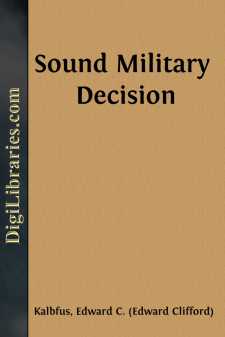Categories
- Antiques & Collectibles 13
- Architecture 36
- Art 48
- Bibles 22
- Biography & Autobiography 813
- Body, Mind & Spirit 142
- Business & Economics 28
- Children's Books 16
- Children's Fiction 13
- Computers 4
- Cooking 94
- Crafts & Hobbies 4
- Drama 346
- Education 46
- Family & Relationships 57
- Fiction 11829
- Games 19
- Gardening 17
- Health & Fitness 34
- History 1377
- House & Home 1
- Humor 147
- Juvenile Fiction 1873
- Juvenile Nonfiction 202
- Language Arts & Disciplines 88
- Law 16
- Literary Collections 686
- Literary Criticism 179
- Mathematics 13
- Medical 41
- Music 40
- Nature 179
- Non-Classifiable 1768
- Performing Arts 7
- Periodicals 1453
- Philosophy 64
- Photography 2
- Poetry 896
- Political Science 203
- Psychology 42
- Reference 154
- Religion 513
- Science 126
- Self-Help 84
- Social Science 81
- Sports & Recreation 34
- Study Aids 3
- Technology & Engineering 59
- Transportation 23
- Travel 463
- True Crime 29
Sound Military Decision
Categories:
Description:
Excerpt
FOREWORD
From the earliest days of recorded history, the facts associated with military operations of the past have been constantly studied. The result has been the accumulation of a mass of information from which conclusions have been drawn as to the causes of success and failure. Although scattered through countless volumes, and nowhere completely systematized and classified, this accepted body of knowledge constitutes the basis for the science of war.
Scientific investigation—that is, the collection, verification, and classification of facts—follows the recurrent procedure of successive analysis, hypothesis, theory, and test. The application of this process to the campaigns of history reveals fundamentals common to all, irrespective of whether the sphere of action has been land, sea, or air. In the ceaseless struggle for supremacy between the offense and the defense, great technological changes have taken place. The successful conduct of war, however, has always depended on effective operations for the creation or maintenance of favorable military situations, whose essential elements have remained unchanged throughout the years (see ).
These fundamental considerations (see ), whatever the detailed form of their presentation, are the basis for the successful conduct of war. The need of such a basis has been felt from very early times. It was not, however, until the early part of the Nineteenth Century that students of warfare appear to have recorded the view that the conduct of war is susceptible of reduction to scientific analysis, and that only through a reasoned theory can the true causes of success and failure be explained.
Such a scientific analysis of any subject has for its chief practical aim the improvement of the art, or practice, of that subject. Forming an important part of the science of war are those new developments in weapons and in other technological fields which, with the passage of time, have brought about great changes in methods of waging war. It is only through founding the art of war—the application of the science of war to actual military situations—on the fundamental truths discovered through the science of war, that changes in method, due to technological evolution, can be made most effective.
In preparing for war, the only practicable peacetime tests are usually restricted to those afforded by examples of the past, by problems such as chart (map) and board maneuvers, and by fleet and field exercises. While the military profession can afford to neglect none of them, such tests can never be conclusive. This fact, however, far from justifying resort to any other procedure, emphasizes the necessity for utilization of the scientific method in order to arrive at conclusions which are as exact as possible.
An exact result is, of course, the aim of all scientific research, but exactitude necessarily depends on the establishment of correct relationships among facts which have so far come to light. Consequently, there is great variation in the degree of accuracy which actually characterizes the several sciences....



